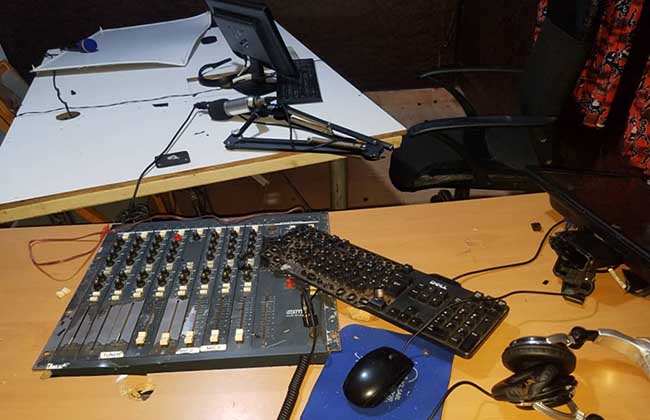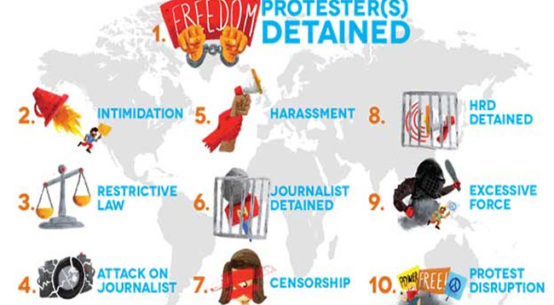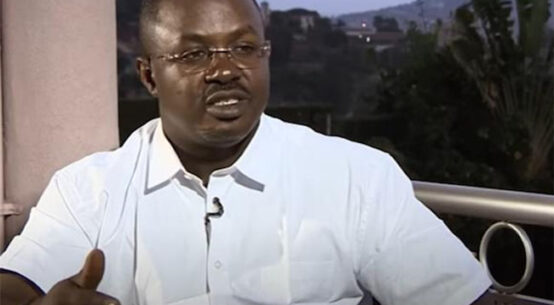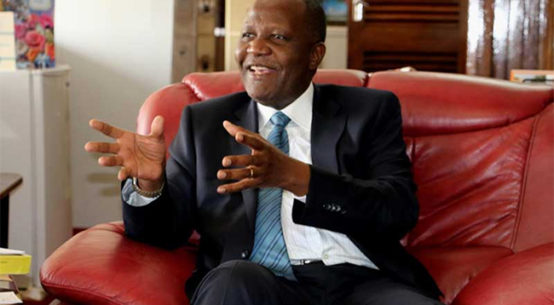
Press freedom in Africa remains under threat with the ransacking of the controversial Capital FM television in Guinea Bissau being the latest incident, fueling concerns from media watchdogs on the commitment of governments to harness the media development.
On Monday, unknown gunmen in the capital ransacked the private radio station in the capital, known for being critical of the government, local media reported citing a manager of the media house as saying. The attack follows a foiled coup in the West African country last week.
Local reports indicate that some masked gunmen had arrived at the station in the capital Bissau in 4×4s and started shooting randomly and trashing radio equipment, according to one of its managers.
“They forced me to kneel down and hit me with the butt of the Kalashnikov,” one of the managers of Capital FM is cited as saying but opted for anonymity.
“A colleague was wounded trying to escape,” he added. “Our equipment was destroyed. We stopped broadcasting.”
Capital FM is highly critical of the government President Umaro Sissoco Embalo, 49, and considered close to Guinea-Bissau’s formerly dominant African Party for the Independence of Guinea and Cape Verde (PAIGC).
Attacks on the station have become more common in recent years. In July 2020, unidentified gunmen also broke into the station and destroyed equipment. The most recent incident comes after a coup attempt on February 1 that claimed 11 lives in impoverished Guinea-Bissau.
Neither the identity nor the motives of the coup plotters was clear, and the army has launched an investigation. Embalo, a reserve brigadier general, took office in February 2020 after winning an election that followed four years of political in-fighting under Guinea-Bissau’s semi-presidential system.
His chief opponent, PAIGC candidate Domingos Simoes Pereira, bitterly contested the result but Embalo declared himself president without waiting for the outcome of his petition to the Supreme Court.
On Saturday, security forces also prevented PAIGC members from holding a meeting in Bissau.
Radio Capital FM was crippled by an attack from uniformed men which resulted in the destruction of its equipment such as the transmitter and mixing console. The attack followed several threats to the station which its Management says were reported to the police.
“We needed to express our indignation; to send a strong message to the perpetrators that we will not be silenced. It is also to alert the authorities that we will not accept anything short of thorough investigations into the incident and the prosecution of the culprits,”
Indira Correia Balde, President of the journalists’ union Sindicato de Jornalistas e Técnicos de Comunicação Social (SINJOTECS), told the MFWA.
The Police have given no update on the state of the investigations they claim to be conducting. SINJOTECS, national partner organisation of the Media Foundation for West Africa (MFWA), which organised the radio blackout protest has given the police up to August 12 to give an update on the incident.
The fact that the attackers were in police uniform lays a huge responsibility on the Police authorities, as the incident affects the image of the service.
It is in the interest of the Police to demonstrate that they do not condone the outrageous conduct. And they can do that only by ensuring the perpetrators, together with whoever might have given the orders for the attack, face the full rigors of the law.
The MFWA urged the police and the government of President Umaro Embalo to respond appropriately to the Monday incident, describing it as a test of their commitment to fighting impunity for crimes against the media.
In recent years, Guinea-Bissau, a coastal state of around two million people south of Senegal, has suffered four military coups since 1974, its most recent in 2012, has had its leadership censuring the press over various new items published or broadcast-a threat to press freedom.
Thirty radio stations in Guinea Bissau suspended broadcast for 24 hours. The act was in solidarity with Radio Capital FM after a disturbing attack on the media outlet.
Seven privately-owned and 23 community radio stations across Guinea-Bissau took part in the act termed “a day of silence”. About thirty journalists also gathered in front of Capital FM’s offices in Bissau to denounce the attack and to show support for the beleaguered radio station.
In 2000, Paula Silva de Melo, a veteran journalist, took to Guinea-Bissau’s national television channel, RTGB, to read aloud a communiqué that openly criticized the government.
Guinea-Bissau had just come out of a civil war that had left media institutions and journalists in a precarious position. Many broadcasters and publications had suffered serious damage to their equipment, and the few outlets that remained active were little more than propaganda tools for the war’s belligerents.
But the country was embarking on a liberalization process that promised to expand press freedoms. Journalists like de Melo were eager to hold power accountable and new private media companies were cropping up to help shape public discourse.
International watchdog- Amnesty International had earlier lamented the sustained attacks against freedom of expression. It argued that freedom of expression is once again under attack in Guinea-Bissau as two journalists face charges of defamation.
Other journalists have been detained and harassed in recent months for criticizing government policies or reporting issues deemed sensitive by the authorities.
“Freedom of expression is a fundamental right enshrined in the Guinean Constitution and the International Covenant on Civil and Political Rights to which Guinea Bissau is a signatory”
The government must take immediate steps to end the arbitrary detention and harassment of journalists and to bring those responsible for such abuses to justice,” Amnesty International said.
Unwarranted attacks on the media have been perpetuated in Africa and beyond by several Governments seeking to silence the media from undertaking their role of a fourth estate.
In DR Congo, journalist Prince Syaghendera was last year forced to go into hiding after an armed group he had reported on, torched his house, media watchdog, Reporters Without Borders (RSF) reported.
It challenged the military authorities in charge of Ituri province, in the Democratic Republic of Congo, to do everything possible to identify those responsible for a targeted arson attack on a reporter’s home and bring them to justice. Ituri is one of the eastern provinces where journalists have repeatedly been the victims of abuses and massacres.
Prince Syaghendera, a reporter for Tuendelee community radio and the Bunia-Info24 news website, has been in hiding for nearly a month, ever since his home in Komanda, in Ituri province, was reduced to ashes in the space of a few hours on 26 September while he was out reporting.
Alerted by neighbours, all he could do was confirm the devastation on his return.
Those who witnessed the arson attack on his home said it was carried out by members of Chini ya Kilima, a militia that has been responsible for many massacres and cases of looting in the region.
Syaghendera says he was directly threatened by this group earlier this year because of reporting in which he blamed them for abuses and acts of criminal violence.
Other recent victims include RadioTélévision Communautaire de Babombi director Joël Musavuli, who was stabbed to death by unidentified assailants in his home in Biakato, in Ituri province.
He had received repeated death threats in connection with his coverage of abuses by both armed groups and military in the east of the country. Many other journalists have had to flee their towns or villages.
At least six community radio stations have had to stop broadcasting because of threats or a fuel shortage. The DRC is ranked 149th out of 180 countries in RSF’s 2021 World Press Freedom Index.
The DW-the Germany news agency notes with awe at the diminishing media freedom on the 2 billion populated African continent, which has suffered gravely last year due to growing authoritarianism and insecurity, especially in East Africa — the region most hostile to journalists on the continent.
Journalists in many parts of Africa are working in increasingly difficult and dangerous circumstances. Political instability, such as the 2021 coups in Sudan, Mali, Guinea and Chad, has led to widespread crackdowns on media workers.
Journalists are also being targeted by both governments and armed groups seeking to control the flow of information in regions wracked by violence and conflict, such as Cameroon, the Sahel, Congo, Ethiopia and Somalia.
DW’s roundup of abuses against journalists released at the end of 2021 in collaboration with the Reporters Without Borders, commonly referred to by its French acronym RSF, sounded an alarm over the growing number of journalists being detained worldwide.
Africa is no exception, with more than 100 journalists arbitrarily arrested and 26 detained from January 1 to December 1, the DW/RSF report established.




